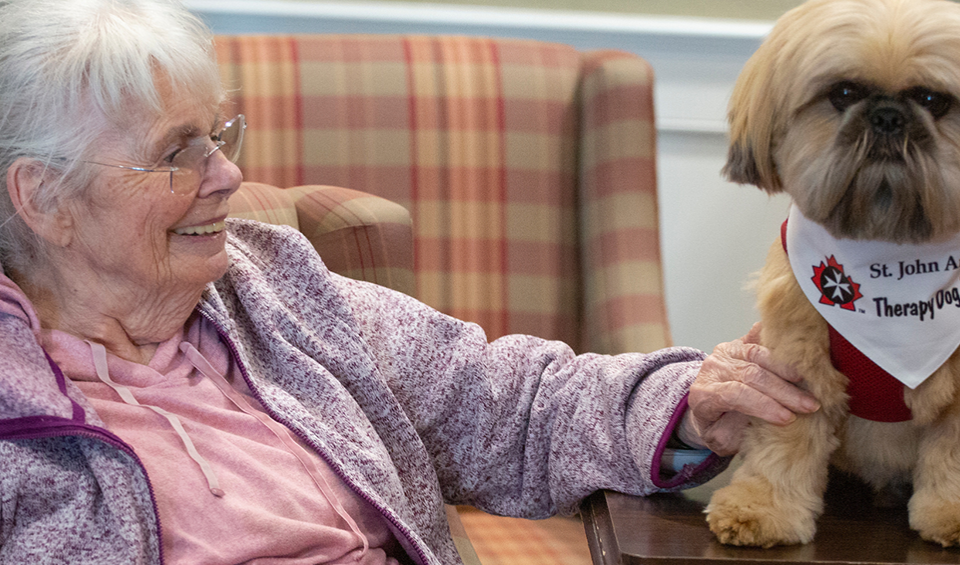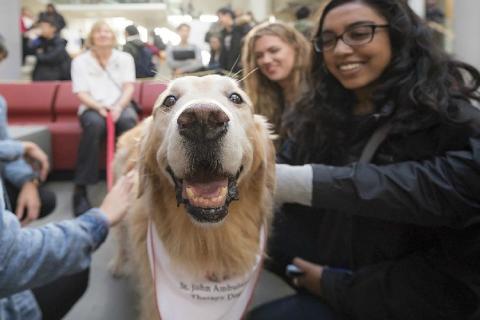St. John Ambulance’s Therapy Dog Program takes a volunteer and their dog into hospitals, seniors' residences, or nursing homes on a weekly basis. Through petting, affection, and regular visitation, many people benefit both physically and emotionally from the unconditional love of a dog, while also providing the volunteer with a unique and rewarding volunteer experience.
The program continues to grow, boasting more than 3,500 volunteer dog teams providing over 275,000 hours of their time. The friendly attention and acceptance of these four-legged volunteers are always greatly appreciated.
Therapy dog services are provided in a wide range of community settings such as:
- Hospitals
- Seniors residences and care facilities
- Schools, universities, and colleges
- Community centres and libraries
The Therapy Dog program provides opportunities for individuals to:
- Talk with the volunteer and the dog
- Feel, touch, pet, and cuddle the dog
- Receive unconditional love from the dog
- Carry-out or practice an activity in the presence of the dog
To be considered for the Therapy Dog program, volunteer handlers (the dog owner) must:
- Be 18 years of age or older (youth between the ages of 16-18 may join the program but must be supervised by an adult therapy dog handler while volunteering);
- be able and willing to commit to the program and a placement facility for at least one year, for once-a-week visits;
- be willing to participate in an over-the-phone informal interview with a Unit Facilitator;
- submit to a criminal records check;
- attend an orientation session, followed by an evaluation of your dog and your dog-handling abilities (see dog requirements below).
To be considered for the program, dogs must:
- be at least 1 year old (preferably 2 years/age of social maturity for most breeds);
- Have lived in a permanent home for at least six months;
- be on a regular regimen of veterinary vaccinations for rabies, parvovirus, distemper, and adenovirus. It is also recommended that dogs be vaccinated for leptospirosis. These may take place on a yearly or three-year basis. Currently, titer testing is not accepted in lieu of vaccinations;
- receive annual veterinarian checks;
- not be fed a raw-meat diet;
- respond to basic commands (sit, stay, lie down, heel at the handler's side on a loose lead);
- not mouth people's arms or hands;
- not jump on people;
- not growl at other dogs or relieve themselves indoors (even submissive peeing).
Please note that St. John Ambulance does not train or provide therapy dogs. We evaluate you and your dog to act as a therapy dog team. We will evaluate your dog’s abilities and behaviours. The training we recommend for this role is basic obedience training and good socialization. Many pet stores and other places offer such training. There isn't a specific program or course we endorse.
EVALUATIONS
During the Therapy Dog Program evaluation, handlers and their dogs will be subjected to a number of situations, stressors, and challenges as part of a mock visit to a healthcare facility. This will test their temperament, sociability, and ability to follow the handler’s lead. Dogs will also be assessed for cleanliness and good grooming.
Some indicators of a suitable St. John Ambulance Therapy Dog Team include:
- Responses that are not fearful or aggressive
- Friendliness towards other dogs and strangers
- Safe and easy handler control
A good therapy dog will beg for attention, using a quiet mannerly disposition. The dog cannot show rejection, nor be too boisterous or assertive in its behaviour. The dog must always be on leash and under control of the handler.
Still have questions? Visit our FAQ page!
We're not accepting any new volunteer applications in British Columbia or Yukon right now, because we're over capacity for onboarding and training. But we truly appreciate your willingness to help. Please check back here monthly for future opportunities.
Ready to apply? CLICK HERE
St. John Ambulance Canada is one of Canada’s oldest charitable organizations. In most cases, we do not receive any federal government funding...
In any disaster, human or natural, St. John Ambulance Canada volunteers are there to offer assistance, expertise, caring and compassion. Our tradition...
When a natural or human disaster strikes, St. John Ambulance volunteers are there with advanced first aid and life-saving skills, experience and...


